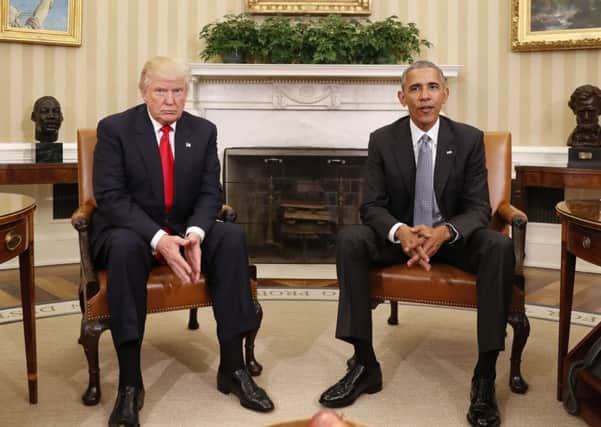Alon Ben-Meir: President-elect must learn how to manage crises


I believe that even those who were deeply disappointed with the results will sooner than later rise above the fray and work to build a more wholesome union.
Notwithstanding the post-election trauma that many Americans are experiencing and the time the Trump administration will need to sort out a host of domestic and foreign policy issues, the US faces numerous foreign crises and it does not have the luxury of time to pause in dealing with them. America’s leadership role and responsibility remain pivotal to mitigate, if not end, many of the violent conflicts sweeping the Middle East in particular.
Advertisement
Hide AdAdvertisement
Hide AdAlthough President-elect Trump is inexperienced and lacks the nuanced knowledge of the complex crises America faces, he must now navigate his own way and develop new strategies, particularly in the areas where Barack Obama fell short, including the Israeli-Palestinian conflict, the Sunni-Shi’ite war and the civil war in Syria.
The Israeli-Palestinian conflict: There is no doubt that President Obama has made supreme efforts to solve the seven-decades old conflict. However admirable his efforts were, the president and his chief mediator, Secretary of State John Kerry, failed to take into account the psychological dimension of the conflict, which has been and remains the core impediment to resolving it.
Throughout the two sets of intensive negotiations in 2009-2010 and 2013-2014, and in spite of the progress made on various conflicting issues such as the Palestinian refugees, the future of Jerusalem, and borders, the failure to mitigate the psychological aspect connected to these issues made it impossible for either side to deliver what they have agreed upon.
At this juncture, the gulf between the two sides has become even deeper and wider, and no amount of mediation, compensation, or coercion can persuade either to make the significant concessions needed to make peace possible.
Advertisement
Hide AdAdvertisement
Hide AdOnly by creating the social, political and psychological atmosphere conducive to peace, and with the support of the Arab states, the EU and other major powers, can the negotiations be resumed with a far better prospect of success. If Trump is concerned about Israel’s future security and political integrity, he must not hesitate to pressure Israel to seek a solution and save it from its own destructive path.
The Sunni-Shi’ite war: Daesh came to being in the wake of the Iraq war, which instigated a renewed violent conflict between the Sunnis and Shiites. Although the eventual defeat of IS is inevitable, it will not bring an end to the Sunni-Shi’ite conflict as long as Shi’ite Iran and Sunni Saudi Arabia are fighting for regional hegemony; they will continue to wage a proxy war in Iraq, Syria and Yemen to secure their goal.
The Trump administration must now understand that maintaining the unity of Iraq as a single country is no longer a viable option. Though the Sunni Iraqis loathe IS, they despise and detest the Shi’ite government in Bagdad even more. To help bring a swifter end to the civil war, the Sunnis need to be granted autonomy along the line of the Iraqi Kurds.
The civil war in Syria: The conflict will not end unless the US changes its approach by putting both Vladimir Putin and Bashir Assad on notice that the slaughter of Syrian civilians must immediately come to an end.
Advertisement
Hide AdAdvertisement
Hide AdThe US cannot assert its commanding regional role and at the same time save the Syrian people from near-complete destruction by leading from behind and merely providing military equipment and materials to the rebels.
That said, the US must recognise that Russia has been for decades and will remain a permanent fixture in Syria, and Iran will not relinquish its long-standing interest and influence in Damascus as Tehran views Syria as the linchpin of the Shi’ite-dominated crescent of land between the Mediterranean and the Gulf. However unorthodox this may seem, the US has little choice but to work with these two powers to find a solution.
Given that Trump is all about “America First” – and that America has significant geopolitical interests in the region – it is imperative that a Trump administration addresses these conflicts in a serious and consistent manner. Trump’s first test will be his choices of advisers, who can assist him to navigate through the thicket of these conflicts.
Whom he chooses and how soon he will act after his inauguration will send a clear message to America’s foes and friends alike where this nation is heading and its resolve to assert its global leadership role.
Dr Alon Ben-Meir is a professor of international relations at the Center for Global Affairs at New York University. He teaches courses on international negotiation and Middle Eastern studies.